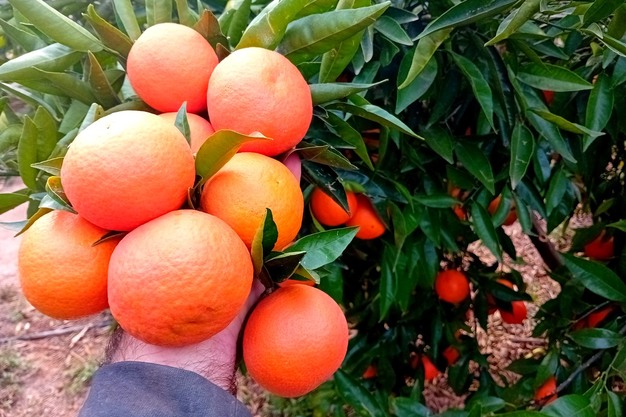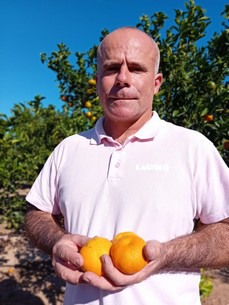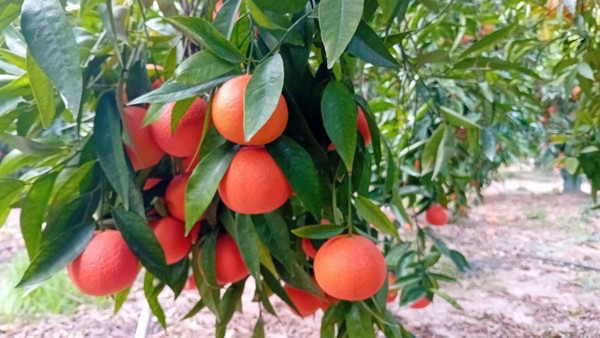With the Clemenules campaign practically finished, the second part of the campaign has already started in the Region of Valencia "with the harvest of the Clemenvilla, Tango (in the hybrid segment), Sando and Hernandina," says Carles Peris, secretary of La Unió.

During the Christmas holidays, there is traditionally a slowdown in the harvest and consumption. In fact, "we have also noticed a slowdown in prices, which had been quite high until now. However, we always harbor hope for the second campaign, as the varieties arrive in a more orderly fashion, and that prevents prices at origin from falling like they sometimes do in the first part of the season."
"Moreover, storms and a drop in temperatures are expected in Central Europe in the next few days. The cold is a positive factor, as it boosts the demand for citrus, so we should be able to recover from the slowdown we have seen in recent days."
 The yields of these varieties are limited, so "we hope everything will proceed as expected," he says. "The forecast is that there may be some competition from Turkey, which has had a larger production of mandarins than last year, but it would only be competition in terms of prices, as Turkish fruit doesn't match the quality of Spanish fruit."
The yields of these varieties are limited, so "we hope everything will proceed as expected," he says. "The forecast is that there may be some competition from Turkey, which has had a larger production of mandarins than last year, but it would only be competition in terms of prices, as Turkish fruit doesn't match the quality of Spanish fruit."
"As for competition in the orange market, Egypt will undoubtedly be a big name in the second part of the campaign. The country has had a stable production, which is offered at very low prices that Spain cannot match, and there are already Spanish importers who have openly declared that they are going to import fruit from Egypt."
"While there is usually some opacity among the biggest operators regarding imports, this year they have already stated that they will be importing, so we foresee new records to be set when it comes to the import of Egyptian fruit by Spain. And that is not good for the sector, because imported fruit always puts pressure on the producing sector and the prices at origin."

"If we go back to 7 million tons, there could be greater difficulties in the market due to losing share to competitors like Egypt"
"So far, since the yields have been so low (among the lowest of the last 10 years), the prices have been very decent. The volumes have been lower than expected, because with the drought, the calibers have eventually been 10% smaller than in the previous campaign. In fact, we've already had two campaigns in which the national harvest has fallen below 6 million tons and prices have behaved well."
And not just in the fresh segment. "An important factor this year is that the price of the fruit going to the processing industry has been good, which helps decongest the fresh market. About 18-20 cents per kilo have been paid for mandarins and clementines, and between 28 and 30 cents for oranges."
"The problems will come later, when we recover our productive capacity," says Carles Peris. "In Spain, which is the leader in the marketing of fresh citrus, a fluid line of work is being opened with Egypt, a country with much lower production standards than ours, and which can offer much lower prices, as well. We cannot forget that we are implementing the commitments of the Green Pact, meeting very strict environmental, food safety, and labor sustainability requirements. And the reality is that we are losing competitiveness against those who are able to produce at a cheaper price."
"Moreover, more and more shelf space is given to cheap fruit, so when a European consumer goes to the supermarket and sees an orange from Spain and another from Egypt, they have a choice between two quality standards, but also two price levels."
"Right now, we are producing a million tons less than what Spain normally produces, but if we recover our productive capacity and go back to 7 million tons, the greater supply could entail greater difficulties and a loss of market share against competitors like Egypt."
For more information:
Carles Peris
La Unió
Carrer del Marquès de Dos Aigües, 3-1 Valencia. Spain
Tel.: +34 963 530 036
launio@launio.org
https://launio.org
